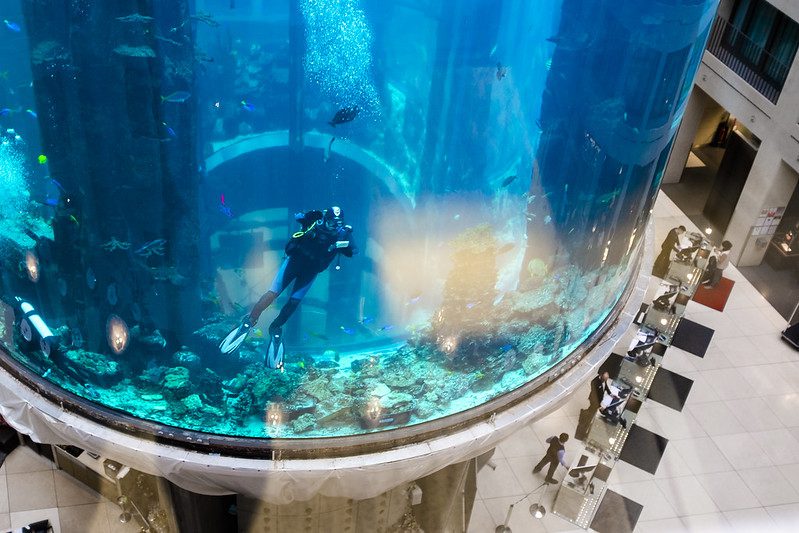Early on Friday morning, December 16th, a 16-meter-high aquarium located in the lobby of a hotel in Berlin burst. The Aquadom was said to be the largest free-standing cylindrical aquarium in the world. Two people were injured and the hotel was evacuated. More than a million liters of water leaked out, devastating the lobby and flowing into the streets. Most of the 1500 tropical fish in the aquarium perished in the accident; only 200 could be rescued and distributed to surrounding aquariums and zoos.
The reason for the sudden bursting of the aquarium is yet to be determined, but so far nothing points toward a directed attack or sabotage. “When an aquarium is defective, it bursts abruptly,” a fire department spokesman said. “This is not a small crack where the water is leaking out, but the entire aquarium burst abruptly.”
The Aquadom was a container made of acrylic glass and was so large—16 meters (52 feet) high, 11.5 meters (38 feet) in diameter that—visitors could ride an elevator through its interior. According to the hotel, about 1,500 fish from over 100 different species lived in the tank filled with one million liters of salt water and containing a real coral reef. The aquarium reportedly underwent comprehensive modernization as recently as the summer of 2020. It was built by the U.S. company Reynolds Polymer Technology. Following the burst, the company immediately sent out a team to investigate what caused the accident.
En Alemania al menos 1,500 peces exóticos murieron está mañana cuando el acuario cilíndrico más grande del mundo estalló.
— Lucía Hernández | Amo La Ciencia (@YoAmoaLaCiencia) December 16, 2022
Hay dos personas heridas.
Las autoridades descartan un ataque y especulan que las bajas temperaturas provocaron la destrucción del Aquadom. pic.twitter.com/bbx6zgxIwq
The accident has given room to ample speculation. The Berliner Zeitung quotes sources claiming the burst could have been caused by a hairline fracture, as acrylic glass is known to age badly. Another possible reason could be a ‘thermal break’ caused by the temperature differences between the tropically heated water tank and the cold outside temperatures, a factor that may have been exacerbated due to this year’s rigid gas-saving regime in Germany.
But Werner Kloas, a water ecologist at the Leibniz Institute in Leipzig, rejected the notion that a singular cause may be determined. “Nothing can be excluded,” Kloas told the Berliner Zeitung, “but when there is no clearly defined cause, multiple factors may have been at play. The cold and the vibrations caused by building sites may have caused a subsidence, which in turn would have put enormous stress on the tank, and may have caused fractures to occur,” Kloas said, adding that “there often is no monocausal explanation, but a complex interplay of unfortunate circumstances.”
While a final decision has not been made, Kloas doesn’t believe the aquarium will be rebuilt, simply because it is unlikely the public would trust such a construction again.





